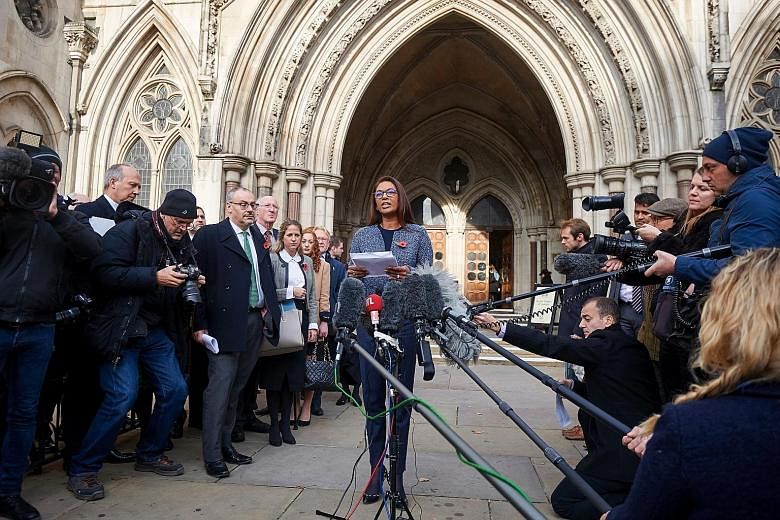Pro-European Union campaigners, who launched a legal challenge against the British government's bid to unilaterally trigger Article 50, rejoiced yesterday as a landmark decision by the High Court gave those powers to elected lawmakers instead.
A group, which calls itself People's Challenge, raised more than £160,000 (S$275,000) to take the case to court after the June 23 referendum.
Set up by Mr Grahame Pigney, 62, who has lived in France for 19 years, and Mr Paul Cartwright, 50, a Gibraltarian national, the group comprises mostly British expatriates living abroad.
Its public face is Ms Gina Miller, a trust fund manager born in Guyana.
"This case was about process, not politics," said a triumphant Ms Miller, 51, outside the court yesterday. "One of the big arguments (in the referendum) was parliamentary sovereignty," she told reporters.
"So you can't, on the day you get back sovereignty, decide you're going to sidestep or throw it away."
Attorney-General Jeremy Wright had called the group's legal bid to thwart Prime Minister Theresa May from invoking Article 50 a "backdoor" attempt to overturn the referendum result - 52 per cent of Britons voted to leave the EU.
Government lawyers assured Mrs May in July that the royal prerogative can be used to trigger Article 50 of the Lisbon Treaty - a formal notification to the EU of the UK's intention to leave.
The use of this executive privilege means it does not require Parliament's vote.
But in yesterday's ruling, the three-judge panel said: "We hold that the secretary of state does not have power under the Crown's prerogative to give notice pursuant to Article 50... for the United Kingdom to withdraw from the European Union."
They did not specify whether Parliament is required to pass new legislation to trigger the exit proceedings. Most lawmakers oppose Brexit, including Mrs May herself before she became Prime Minister.
The ruling has once again divided opinion, with some welcoming parliamentary scrutiny of the government's Brexit strategy and others decrying it as a slap in the faces of those who voted to leave.
Mr Nigel Farage, leader of the Eurosceptic UK Independence Party (Ukip) and one of the most prominent Leave campaigners, warned on Twitter of a public backlash against the ruling.
"I worry that a betrayal may be near at hand," he said. "I now fear every attempt will be made to block or delay triggering Article 50. They have no idea (of the) level of public anger they will provoke."
Bank of England governor Mark Carney also spoke of the uncertainty that the UK economy could face in the wake of the high court ruling.
"The negotiations haven't even begun. There will be volatility as those negotiations proceed," Mr Carney said at the central bank's quarterly inflation report press conference yesterday.
"That uncertainty does bear down on business investment."

